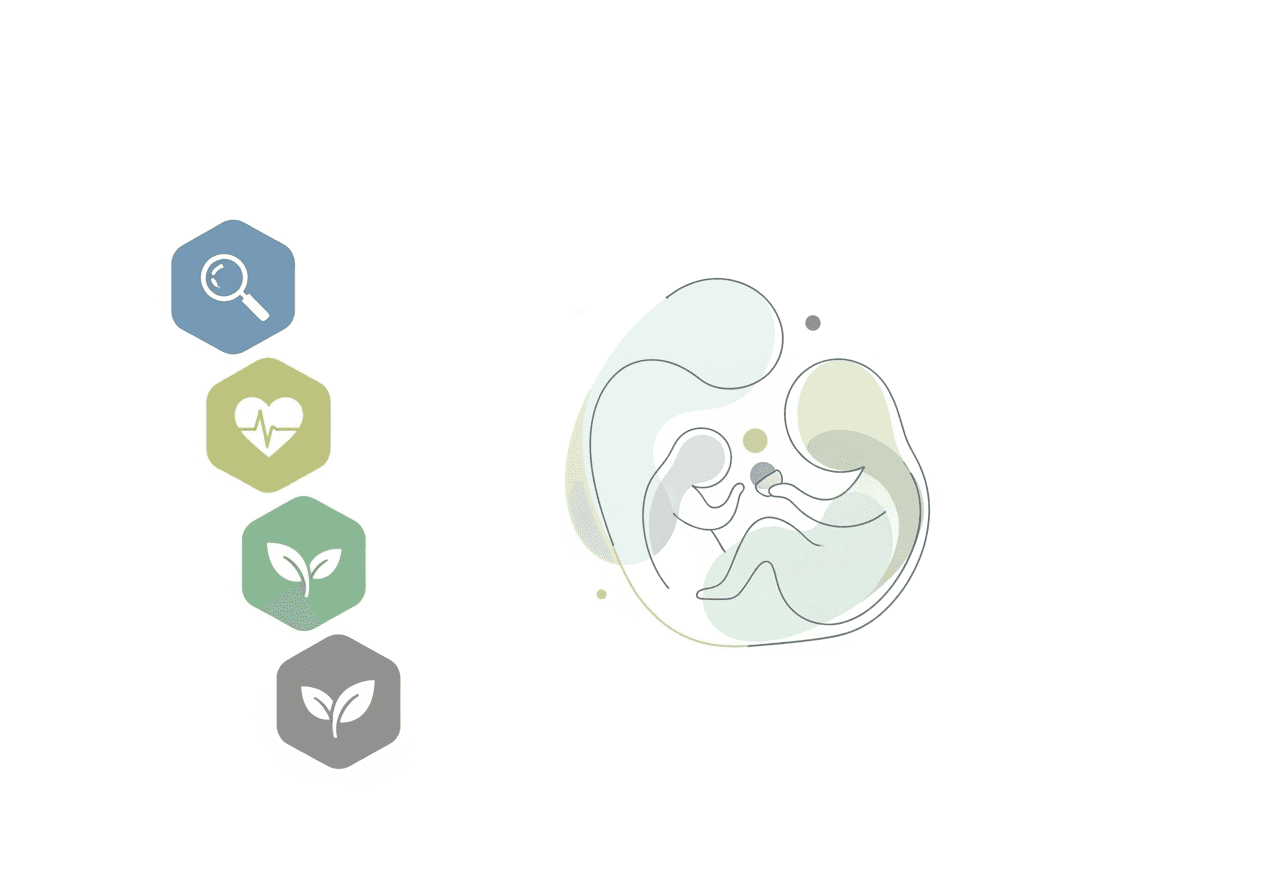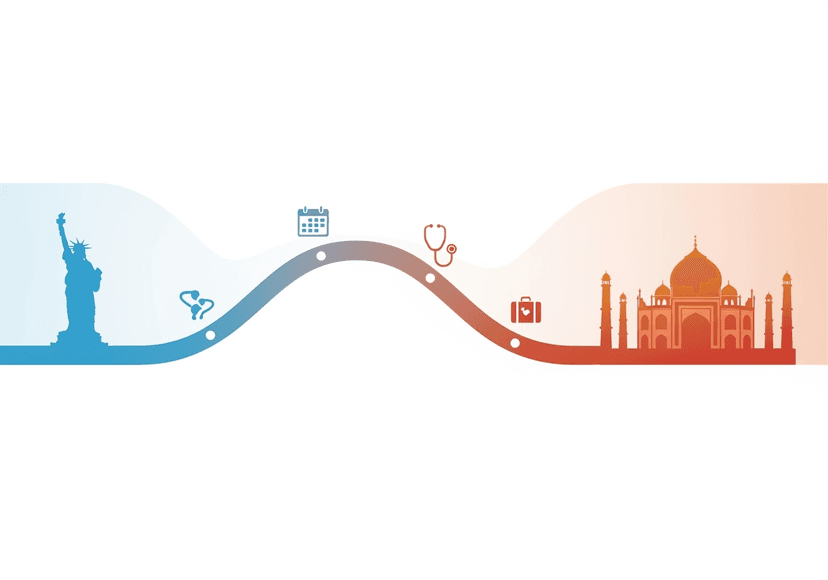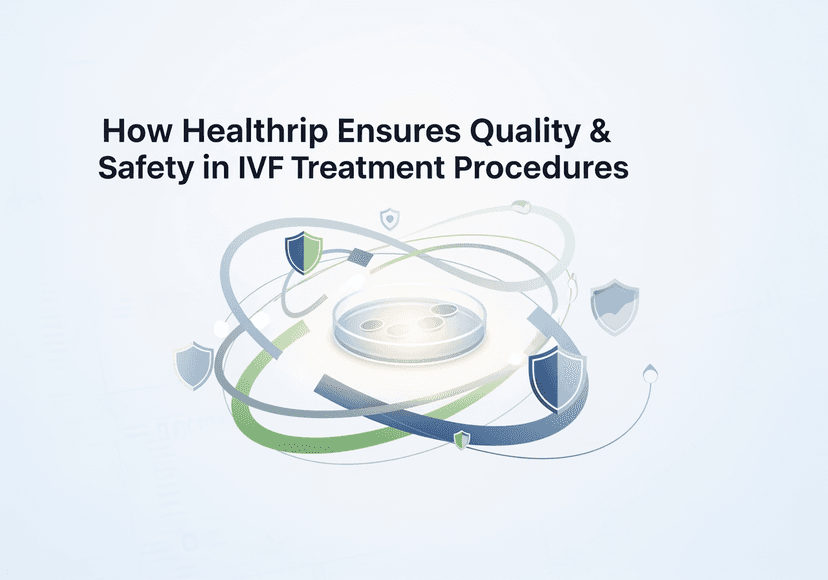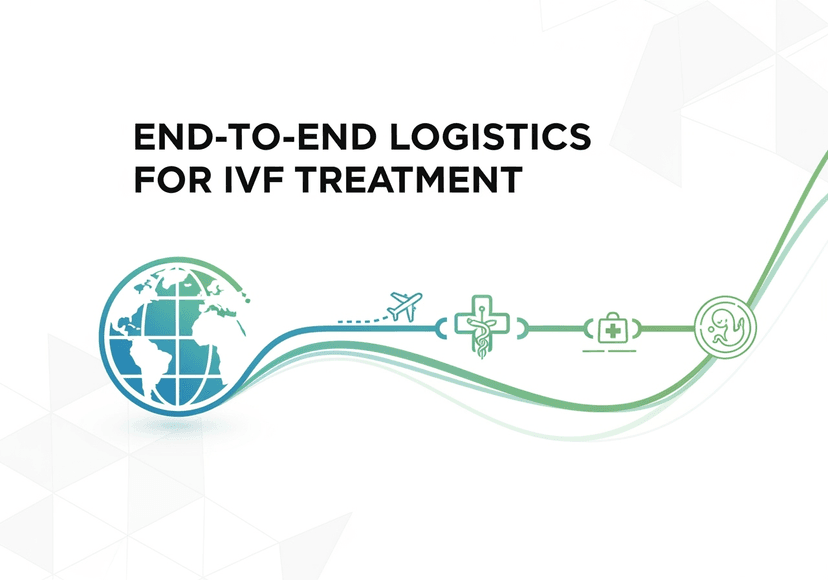
Is IVF Treatment Right for You? Healthtrip Explains Evaluation Steps
13 Oct, 2025
 Healthtrip
Healthtrip- Understanding IVF: A Basic Overview < li>Who is IVF For? Common Infertility Issues Addressed
- Pre-IVF Evaluation: Key Diagnostic Tests to Consider At Saudi German Hospital Cairo, Egypt and Vejthani Hospital
- Factors Influencing IVF Success Rates: What to Discuss with Your Doctor at Memorial Sisli Hospital
- Cost Considerations and Funding Options for IVF at Fortis Memorial Research Institute, Gurgaon
- Exploring Alternative Fertility Treatments: When IVF Might Not Be the First Choice
- The Emotional Journey of IVF: Preparing for the Ups and Downs at Bangkok Hospital
- Conclusion: Making an Informed Decision About IVF
Initial Consultation and Fertility Assessment
The first step in determining if IVF is right for you involves a comprehensive consultation with a fertility specialist. During this consultation, the doctor will review your medical history, including any previous fertility treatments, surgeries, or medical conditions. They will also conduct a thorough physical examination to assess your overall health. This is a critical stage because it lays the groundwork for understanding your unique fertility challenges. The fertility specialist will likely order a series of tests to evaluate both partners. For women, these tests may include blood tests to measure hormone levels, such as follicle-stimulating hormone (FSH), luteinizing hormone (LH), and anti-Müllerian hormone (AMH), which provide insights into ovarian reserve. An ultrasound will also be performed to examine the uterus and ovaries. For men, a semen analysis is essential to assess sperm count, motility, and morphology. These tests help identify potential issues like low sperm count or poor egg quality. Furthermore, the doctor might recommend additional tests based on your specific situation, such as genetic screening or hysteroscopy to examine the uterine cavity. Hospitals like Fortis Escorts Heart Institute and Vejthani Hospital offer state-of-the-art diagnostic facilities to ensure accurate assessment. Remember, this initial assessment is not just about collecting data; it's about building a relationship with your fertility specialist and creating a personalized plan.
Most popular procedures in India
Evaluating Medical History and Specific Fertility Issues
A deep dive into your medical history is crucial to understanding the root causes of your fertility challenges. Factors like endometriosis, polycystic ovary syndrome (PCOS), or previous pelvic infections can significantly impact your ability to conceive naturally. Similarly, in men, issues like varicocele, hormonal imbalances, or past infections can affect sperm production and function. The fertility specialist will meticulously review your medical records, asking detailed questions about your past health experiences. They will also consider any family history of infertility or genetic disorders. This comprehensive review helps the doctor tailor the diagnostic process and identify the most appropriate treatment options. For instance, if you have a history of recurrent miscarriages, the doctor might recommend genetic testing to screen for chromosomal abnormalities. If endometriosis is suspected, a laparoscopy might be necessary to confirm the diagnosis and assess the severity of the condition. Understanding these underlying issues is vital because it allows the fertility specialist to address them directly, increasing the chances of IVF success. Healthtrip can connect you with experienced doctors at hospitals like Memorial Bahçelievler Hospital and Saudi German Hospital Cairo, Egypt, who specialize in diagnosing and treating complex fertility issues, ensuring you receive the best possible care tailored to your specific needs. This step is about creating a clear roadmap, identifying the obstacles, and charting a course towards overcoming them.
Wellness Treatments
Give yourself the time to relax
Lowest Prices Guaranteed!

Lowest Prices Guaranteed!
Considering Age and Ovarian Reserve
Age plays a significant role in fertility, particularly for women. As women age, their ovarian reserve—the quantity and quality of their eggs—naturally declines. This decline typically accelerates after the age of 35. The fertility specialist will evaluate your ovarian reserve through blood tests, particularly AMH levels, and antral follicle count (AFC) via ultrasound. These tests provide valuable information about the number of eggs remaining in your ovaries and their potential to develop into healthy embryos. If your ovarian reserve is low, the doctor will discuss the implications for IVF success and explore alternative strategies, such as using donor eggs. Similarly, while age doesn't affect male fertility as dramatically, sperm quality and quantity can decline with age. The fertility specialist will consider the male partner's age and semen analysis results when assessing the overall chances of success. It's essential to have an honest and open conversation with your doctor about the impact of age on your fertility. They can provide realistic expectations and guide you toward the most appropriate treatment options. At Healthtrip, we understand the sensitivity of this topic and strive to connect you with compassionate and experienced doctors at facilities like LIV Hospital, Istanbul and First Fertility Bishkek, Kyrgyzstan, who can provide personalized guidance and support throughout your fertility journey. This stage is about facing reality with hope, understanding the challenges, and making informed decisions based on the best available information.
Evaluating Emotional and Financial Readiness
Undergoing IVF is not just a physical process; it's an emotional and financial investment. It's important to honestly assess your emotional readiness before embarking on this journey. IVF can be stressful, involving multiple appointments, hormonal injections, and the emotional roller coaster of waiting for results. It's crucial to have a strong support system in place, whether it's your partner, family, friends, or a therapist. Mental health professionals can provide valuable coping strategies and support throughout the process. Similarly, the financial aspect of IVF should not be overlooked. IVF can be expensive, and it's essential to understand the costs involved, including medication, procedures, and potential additional treatments like genetic testing. Check if your insurance covers any part of the treatment. Explore financing options or grants that can help alleviate the financial burden. It's also wise to be mentally prepared for the possibility that IVF may not be successful on the first attempt, and additional cycles may be needed. At Healthtrip, we recognize the importance of holistic support and can connect you with hospitals like Quironsalud Hospital Toledo and Max Healthcare Saket, that offer comprehensive care, including counseling services, to help you navigate the emotional and financial challenges of IVF. Remember, taking care of your mental and financial well-being is just as crucial as the medical aspects of the treatment. This is about ensuring you're prepared to navigate the journey, armed with both medical knowledge and emotional resilience.
Understanding the IVF Process and Success Rates
Before making a final decision, it's important to thoroughly understand the IVF process and realistic success rates. The IVF process involves several steps, including ovarian stimulation, egg retrieval, fertilization, embryo culture, and embryo transfer. Your fertility specialist will explain each step in detail, outlining what to expect and potential risks. Success rates can vary depending on factors like age, ovarian reserve, and the underlying cause of infertility. It's essential to discuss success rates specific to your situation with your doctor. Don't hesitate to ask questions about the clinic's success rates, the number of embryos typically transferred, and strategies to improve your chances of success. Understanding the IVF process and realistic success rates can help you make an informed decision and manage your expectations. Be wary of clinics that make overly optimistic promises or guarantee success. Look for transparent and honest communication about the potential benefits and risks of IVF. Healthtrip partners with reputable hospitals like BNH Hospital and NMC Specialty Hospital, Abu Dhabi, that provide comprehensive information and realistic expectations, ensuring you are well-informed throughout your fertility journey. This stage is about demystifying the process, understanding the possibilities, and making a decision based on realistic expectations.
Understanding IVF: A Basic Overview
In Vitro Fertilization (IVF) is a beacon of hope for many individuals and couples who are navigating the challenges of infertility. At its core, IVF is a complex series of procedures designed to assist with conception. The process involves retrieving mature eggs from a woman's ovaries and fertilizing them with sperm in a laboratory. Once fertilization occurs, the resulting embryo or embryos are then transferred to the woman's uterus with the hope that a successful pregnancy will ensue. This intricate process has evolved significantly over the years, offering increasingly advanced techniques and improved success rates. For those who have faced roadblocks in conceiving naturally, IVF represents a tangible pathway to parenthood. It's a journey that often involves careful planning, emotional resilience, and the support of experienced medical professionals. Healthtrip understands the sensitivity and complexity involved in this journey and aims to connect you with the best facilities and experts to guide you through each step.
The journey of IVF is not a one-size-fits-all approach; it is highly personalized and tailored to meet the unique needs of each individual or couple. The process typically begins with a consultation and comprehensive evaluation to determine the underlying causes of infertility. Once a personalized treatment plan is in place, the woman undergoes ovarian stimulation using fertility medications to encourage the development of multiple eggs. Regular monitoring, including blood tests and ultrasounds, is crucial during this phase to ensure optimal egg development and to minimize potential risks. When the eggs are mature, they are retrieved through a minor surgical procedure called egg retrieval. After retrieval, the eggs are fertilized with sperm in the laboratory, and the resulting embryos are closely monitored for development. Finally, one or more embryos are selected for transfer to the uterus, with the hope that implantation and a healthy pregnancy will follow. Healthtrip is dedicated to providing comprehensive information and support throughout this process, ensuring that patients feel informed and empowered every step of the way.
Who is IVF For? Common Infertility Issues Addressed
IVF is not just a procedure; it's a solution tailored to address a wide array of infertility issues that prevent individuals and couples from conceiving naturally. It's like having a personalized roadmap when you're lost in the wilderness of infertility! One of the most common reasons people turn to IVF is when the woman has blocked or damaged fallopian tubes, which prevent the egg from traveling from the ovary to the uterus or the sperm from reaching the egg. Similarly, IVF can be highly beneficial for men experiencing low sperm count, poor sperm motility (movement), or abnormal sperm morphology (shape). In these cases, techniques like Intracytoplasmic Sperm Injection (ICSI), where a single sperm is injected directly into the egg, can significantly improve fertilization rates. Healthtrip recognizes the diverse range of challenges that prospective parents face and provides access to specialized care that caters to these specific needs. We aim to be the compass guiding you toward the right medical expertise and support for your unique situation.
Beyond structural or sperm-related issues, IVF also offers hope for individuals and couples facing other types of infertility. Women with ovulation disorders, such as Polycystic Ovary Syndrome (PCOS), can benefit from IVF, as the procedure bypasses the need for natural ovulation. Similarly, couples experiencing unexplained infertility, where the cause of their inability to conceive remains unknown despite thorough testing, may find success with IVF. In cases of endometriosis, a condition where the uterine lining grows outside the uterus, IVF can improve the chances of pregnancy by directly fertilizing the egg and implanting the embryo in the uterus, bypassing the effects of endometriosis on the reproductive organs. Furthermore, IVF is often used by single women or same-sex couples who wish to start a family using donor sperm or eggs. Healthtrip is committed to connecting you with leading fertility clinics like Saudi German Hospital Cairo, Egypt, which offer comprehensive diagnostic services and personalized treatment plans to address various infertility challenges. Think of us as your matchmaker, connecting you with the perfect healthcare provider to help you realize your dream of parenthood.
Pre-IVF Evaluation: Key Diagnostic Tests to Consider At Saudi German Hospital Cairo, Egypt and Vejthani Hospital
Before embarking on the IVF journey, a thorough pre-IVF evaluation is essential to understand the underlying causes of infertility and to tailor the treatment plan for the best possible outcome. This evaluation is like conducting a comprehensive audit before launching a major project! At Saudi German Hospital Cairo, Egypt, and Vejthani Hospital, a series of key diagnostic tests are performed to assess both the woman's and the man's reproductive health. For women, these tests typically include blood tests to measure hormone levels, such as follicle-stimulating hormone (FSH), luteinizing hormone (LH), estradiol, and anti-Müllerian hormone (AMH). AMH, in particular, provides valuable information about the woman's ovarian reserve, which is the quantity and quality of her remaining eggs. A transvaginal ultrasound is also performed to evaluate the uterus and ovaries, detect any structural abnormalities, and assess the antral follicle count, which is another indicator of ovarian reserve. Healthtrip emphasizes the importance of these initial assessments to ensure that patients receive the most appropriate and effective IVF treatment. We help you navigate through the maze of medical jargon and tests, ensuring you're well-informed and prepared.
For men, the cornerstone of the pre-IVF evaluation is a semen analysis. This test assesses various parameters of the sperm, including sperm count, motility, morphology, and volume. If the semen analysis reveals any abnormalities, further tests may be recommended to investigate the underlying cause. In some cases, genetic testing may be advised to rule out any genetic factors contributing to infertility. Both Saudi German Hospital Cairo, Egypt, and Vejthani Hospital offer state-of-the-art diagnostic facilities and experienced specialists who can interpret the results of these tests and develop a personalized treatment plan. Furthermore, Healthtrip can assist you in coordinating these pre-IVF evaluations, providing access to reputable medical centers and facilitating communication with healthcare professionals. We're here to make the process as smooth and stress-free as possible, so you can focus on your journey to parenthood. Think of us as your personal concierge, ensuring every detail is taken care of, allowing you to concentrate on the bigger picture.
In addition to hormone testing, ultrasound, and semen analysis, other diagnostic tests may be considered based on the individual's medical history and specific circumstances. These tests may include a hysterosalpingogram (HSG) to evaluate the patency of the fallopian tubes, or a hysteroscopy to directly visualize the uterine cavity and identify any polyps, fibroids, or other abnormalities. In some cases, genetic carrier screening may be recommended to assess the risk of passing on certain genetic disorders to the offspring. These comprehensive evaluations are designed to optimize the chances of IVF success and minimize potential risks. Healthtrip partners with leading fertility clinics and hospitals, such as Saudi German Hospital Cairo, Egypt, and Vejthani Hospital, to ensure that patients receive the highest standard of care and the most advanced diagnostic testing available. We believe that informed decision-making is key to a successful IVF journey, and we are committed to providing the information and support you need to make the best choices for your family. Consider Healthtrip your trusted companion, providing you with the resources and expertise to navigate the complexities of infertility treatment.
Also Read:
Factors Influencing IVF Success Rates: What to Discuss with Your Doctor at Memorial Sisli Hospital
Navigating the world of IVF can feel like trying to decipher a complex code, and understanding the factors that influence its success is crucial. It’s not a one-size-fits-all scenario; several elements play a vital role in determining the outcome. Age is a significant determinant, with younger women generally experiencing higher success rates due to better egg quality. The quality and quantity of eggs retrieved are paramount. Ovarian reserve, a measure of the number of eggs a woman has, naturally declines with age, affecting IVF outcomes. Similarly, the health of the sperm also plays a critical role. Sperm motility, morphology (shape), and count are all assessed to ensure optimal fertilization. Equally important is the health of the uterus, the environment where the embryo will implant and develop. Any uterine abnormalities, such as fibroids or polyps, can hinder implantation and are typically addressed before starting IVF. Lifestyle factors like smoking, excessive alcohol consumption, and obesity can negatively impact both egg and sperm quality, reducing the chances of success. Certain underlying medical conditions, such as polycystic ovary syndrome (PCOS) or endometriosis, can also affect IVF outcomes. It’s essential to manage these conditions effectively before embarking on IVF. Discussing all these factors with your doctor, especially at a reputable institution like Memorial Sisli Hospital (https://www.healthtrip.com/hospital/memorial-sisli-hospital), allows for a personalized approach, optimizing your chances of a successful pregnancy.
The expertise of the IVF clinic and the embryology lab cannot be overstated. The skill of the fertility specialists in stimulating the ovaries, retrieving eggs, and performing the embryo transfer significantly impacts the outcome. State-of-the-art embryology labs, like those at Memorial Sisli Hospital, provide the ideal environment for fertilization and embryo development. Techniques such as intracytoplasmic sperm injection (ICSI) and preimplantation genetic testing (PGT) can further enhance success rates. The number of embryos transferred also influences the likelihood of pregnancy, but transferring multiple embryos increases the risk of multiple pregnancies, which can carry additional complications. Therefore, a careful balance is required, considering the individual's circumstances. Moreover, the overall health and well-being of the woman undergoing IVF are crucial. Stress levels, diet, and exercise can all impact hormone levels and overall fertility. Engaging in stress-reducing activities, maintaining a healthy diet, and getting regular exercise can create a more favorable environment for conception. Remember, IVF is a journey, and understanding these factors enables you to actively participate in your treatment plan, working collaboratively with your doctor to achieve the best possible outcome. Open communication and realistic expectations are key to navigating this process with confidence and hope.
Also Read:
Cost Considerations and Funding Options for IVF at Fortis Memorial Research Institute, Gurgaon
The financial aspect of IVF is often a significant concern for couples considering this fertility treatment. The cost can vary widely depending on several factors, including the clinic's location, the specific procedures involved, and the number of cycles required. Basic IVF typically includes ovarian stimulation, egg retrieval, fertilization, and embryo transfer but may not cover additional procedures like ICSI or PGT, which can add to the overall expense. Medication costs also play a crucial role, as fertility drugs can be quite expensive and may be required for multiple cycles. Furthermore, the number of monitoring appointments, ultrasounds, and lab tests can contribute to the total cost. It's essential to have a clear understanding of all the potential expenses involved before starting IVF. Clinics like Fortis Memorial Research Institute, Gurgaon (https://www.healthtrip.com/hospital/fortis-memorial-research-institute), often provide detailed cost breakdowns and payment plans to help couples budget accordingly. Consider the long-term perspective; multiple cycles may be necessary to achieve pregnancy, so factoring in the potential cumulative costs is wise. Healthtrip can assist in comparing costs across different clinics to find options that align with your budget. Remember to inquire about any hidden fees or additional charges that may arise during the treatment process to avoid financial surprises.
Exploring funding options is a vital step in managing the financial burden of IVF. Many couples rely on their savings or loans to cover the costs, but several alternative avenues exist. Some insurance companies offer partial or full coverage for fertility treatments, so it's worth checking your policy details. However, coverage can vary significantly depending on the plan and the state. Additionally, some clinics offer financing options or payment plans to make IVF more accessible. Grants and scholarships for fertility treatments are available through various organizations, providing financial assistance to eligible couples. These programs often have specific eligibility criteria, such as income limits or medical requirements, so researching and applying early is advisable. Crowdfunding platforms can also be a viable option for raising funds from friends and family. Creating a compelling story and sharing your journey can garner support from your network. Consider the tax implications of IVF, as some expenses may be tax-deductible. Consulting with a financial advisor can help you navigate the options and create a realistic budget. Remember, the financial aspect of IVF can be stressful, but exploring all available resources can alleviate some of the burden and make your dream of starting a family more attainable.
Also Read:
Exploring Alternative Fertility Treatments: When IVF Might Not Be the First Choice
While IVF is a highly effective fertility treatment, it’s not always the first or only option. Depending on the underlying cause of infertility, several alternative treatments may be considered. Intrauterine insemination (IUI), where sperm is directly placed into the uterus, is often recommended for couples with mild male factor infertility or unexplained infertility. IUI is less invasive and less expensive than IVF, making it a good starting point for some couples. Ovulation induction, using medications to stimulate the ovaries to release eggs, can be effective for women with irregular ovulation. This treatment is often combined with timed intercourse or IUI to increase the chances of conception. Lifestyle modifications, such as weight loss, smoking cessation, and reducing alcohol consumption, can significantly improve fertility for both men and women. Addressing underlying medical conditions, such as thyroid disorders or PCOS, can also enhance fertility naturally. Surgical interventions, such as laparoscopy or hysteroscopy, may be necessary to correct structural abnormalities in the reproductive organs. These procedures can remove fibroids, polyps, or scar tissue that may be hindering fertility. Exploring these alternatives before resorting to IVF can save time, money, and emotional stress. A comprehensive evaluation by a fertility specialist is essential to determine the most appropriate treatment plan based on your individual circumstances. Remember, there's no one-size-fits-all approach to fertility, and what works for one couple may not be the best option for another.
Fertility medications play a crucial role in many alternative treatments. Clomiphene citrate and letrozole are commonly used to induce ovulation in women with PCOS or other ovulatory disorders. Gonadotropins, injectable medications that stimulate the ovaries to produce multiple eggs, are often used in conjunction with IUI or timed intercourse. These medications require careful monitoring to avoid complications such as ovarian hyperstimulation syndrome (OHSS). Assisted reproductive technologies (ART) beyond IVF, such as gamete intrafallopian transfer (GIFT) and zygote intrafallopian transfer (ZIFT), are less commonly used today but may be considered in specific cases. GIFT involves placing eggs and sperm directly into the fallopian tubes, allowing fertilization to occur naturally within the body. ZIFT involves fertilizing eggs in the lab and then placing the resulting zygotes into the fallopian tubes. These procedures are more invasive than IUI but less invasive than IVF. Complementary therapies, such as acupuncture, yoga, and herbal remedies, may be used to support fertility treatments. While these therapies are not scientifically proven to increase pregnancy rates, they can help reduce stress and improve overall well-being. It’s essential to discuss any complementary therapies with your doctor to ensure they are safe and do not interfere with your medical treatment. Remember, exploring all available options and working closely with your fertility specialist can help you make informed decisions and increase your chances of a successful pregnancy.
Also Read:
The Emotional Journey of IVF: Preparing for the Ups and Downs at Bangkok Hospital
Undergoing IVF is not just a physical process; it’s an emotional rollercoaster that can test even the strongest individuals and couples. The journey is filled with hope, anticipation, anxiety, and sometimes, disappointment. Preparing for the emotional ups and downs is crucial for maintaining your mental and emotional well-being throughout the process. Acknowledge that it's okay to feel a wide range of emotions, from excitement to frustration. Don't suppress your feelings; instead, find healthy ways to express them, such as talking to a therapist, joining a support group, or journaling. Open communication with your partner is essential. IVF can put a strain on your relationship, so it's important to be honest about your feelings and support each other. Remember, you're in this together. Setting realistic expectations is key to managing disappointment. IVF success rates vary, and it may take multiple cycles to achieve pregnancy. Don't put too much pressure on yourself or your partner. Focus on taking things one step at a time. Seeking professional counseling or therapy can provide valuable support. A therapist can help you cope with stress, anxiety, and depression, as well as navigate the complex emotions associated with IVF. Institutions like Bangkok Hospital (https://www.healthtrip.com/hospital/bangkok-hospital) often have counseling services available to support patients undergoing fertility treatment.
Building a strong support system is vital for coping with the emotional challenges of IVF. Surround yourself with friends and family who understand and support your journey. Avoid people who are judgmental or dismissive of your feelings. Joining a support group can connect you with other couples going through similar experiences. Sharing your stories and experiences can provide comfort and validation. Engaging in self-care activities can help reduce stress and improve your overall well-being. Make time for activities you enjoy, such as exercise, yoga, meditation, or hobbies. Prioritize your physical and mental health. Practicing mindfulness can help you stay present and focused on the moment. Mindfulness techniques, such as deep breathing and meditation, can reduce anxiety and improve your ability to cope with stress. Remember, it's okay to ask for help. Don't hesitate to reach out to your doctor, therapist, or support group when you need it. Taking care of your emotional well-being is just as important as taking care of your physical health during IVF. With the right support and coping strategies, you can navigate the emotional challenges of IVF and increase your chances of a successful outcome.
Conclusion: Making an Informed Decision About IVF
Deciding whether or not to pursue IVF is a deeply personal and complex decision that requires careful consideration and thorough research. There's no right or wrong answer, and the best choice depends on your individual circumstances, medical history, and personal values. Gathering comprehensive information about IVF, including its benefits, risks, and alternatives, is the first step in making an informed decision. Consult with a fertility specialist to discuss your specific situation and receive personalized recommendations. Consider the emotional and financial implications of IVF. It's a demanding process that can take a toll on your mental and emotional well-being, as well as your finances. Make sure you're prepared for the challenges ahead. Discuss your options with your partner and other trusted individuals. Their support and perspective can be invaluable in helping you make the right decision. Remember, you're not alone. Many couples have successfully navigated the IVF journey and gone on to have children. Lean on your support system and trust your instincts. Evaluate different fertility clinics and their success rates. Choose a clinic with experienced professionals and a proven track record. Healthtrip can help you compare clinics and find the best option for your needs. Prioritize your overall health and well-being. IVF is most likely to be successful when you're in good physical and mental health.
Think about the long-term implications of your decision. IVF can be a life-changing experience, and it's important to consider the impact it will have on your life and your family. Be realistic about your expectations. IVF is not a guaranteed path to pregnancy, and it may take multiple cycles to achieve success. Don't give up hope, but be prepared for the possibility of disappointment. Weigh the benefits and risks of IVF carefully. While IVF can significantly increase your chances of getting pregnant, it also carries certain risks, such as multiple pregnancies and ovarian hyperstimulation syndrome (OHSS). Make sure you understand these risks before proceeding. Consider alternative fertility treatments. IVF is not always the first or only option, and there may be other treatments that are more appropriate for your situation. Discuss these options with your doctor. Take your time to make a decision. There's no rush, and it's important to feel comfortable and confident with your choice. Trust your intuition and make the decision that feels right for you. Ultimately, the decision to pursue IVF is a personal one. There's no right or wrong answer, and the most important thing is to make an informed choice that aligns with your values and goals. Regardless of your decision, know that Healthtrip is here to support you on your journey to parenthood.
Related Blogs

Comparing Success Rates of Joint Replacement Across Healthtrip Hospitals
Detailed guide on joint replacement, featuring doctors, hospitals, risks, recovery,

Latest Techniques Used for Joint Replacement in India via Healthtrip
Detailed guide on joint replacement, featuring doctors, hospitals, risks, recovery,

Healthtrip's Process for Booking Your Joint Replacement in India
Detailed guide on joint replacement, featuring doctors, hospitals, risks, recovery,

Best Doctors for Joint Replacement in Top Healthtrip Hospitals
Detailed guide on joint replacement, featuring doctors, hospitals, risks, recovery,

How Healthtrip Ensures Quality & Safety in IVF Treatment Procedures
Detailed guide on ivf treatment, featuring doctors, hospitals, risks, recovery,

End-to-End Logistics for IVF Treatment with Healthtrip's Support
Detailed guide on ivf treatment, featuring doctors, hospitals, risks, recovery,










